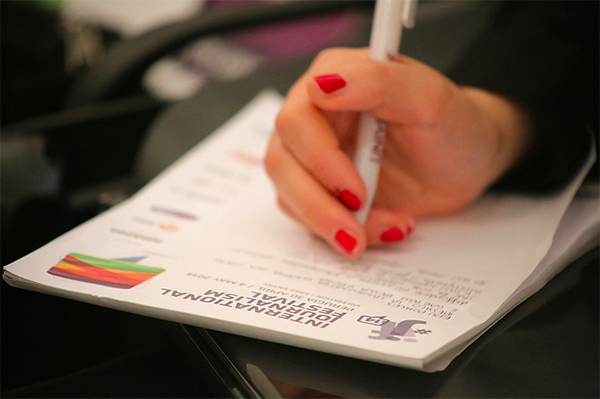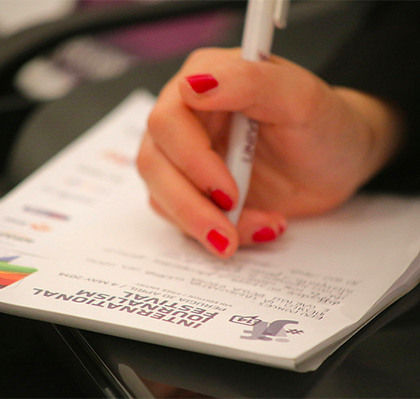 photo by Danila D’Amico
photo by Danila D’Amico
With Wikileaks, and more recently with the NSA surveillance stories, online platforms where anonymous sources can directly upload information have emerged all around the world. These platforms present reporters with both opportunities and challenges, said Claudio Agosti from the HERMES Center for Transparency and Digital Human Rights. He chaired a panel discussion on the issue at the 2014 edition of the International Journalism Festival in Perugia.
“Whistleblowing is being used as a source by reporters now more than ever,” said Philip Di Salvo, a researcher from the European Journalism Observatory at the Università della Svizzera italiana. “Some platforms are only publishing content for others to use, whilst other platforms are also producing their own content”.
Whistleblowing demands different platforms
Philip Di Salvo gave the example of the US-based International Consortium of Investigative Journalists (ICIJ) which has gained recognition with the offshoreleaks investigation. The ICIJ collaborates with media outlets around the world to land the stories closer to the readers, in their own language. He said that the NGO Reporters Without Borders has a platform called “We fight censorship”, on which censored articles are published. Even the distinguished The New Yorker has its own digital dead drop called StrongBox. In Germany, Zeit Online has created Briefkasten.
Attila Mong presented Atlatszo, a Hungarian organisation founded in 2011 and of which he is a board member. Atlatszo operates three different platforms: a freedom of information request website where anybody can type in a question that is directly sent to the concerned authority; a website called ipaidabribe.com to denounce corruption cases; and finally a TOR-based leaking platform developed with Globaleaks, an organisation that helps activists and reporters guarantee the security of their leaking platforms.
“We define ourselves as an anti-corruption activist organisation,” said Attila Mong. “We publish the requests for information we send to state institutions, ministries, and local communities. The public’s trust in media outlets in Hungary is getting lower and lower and we can help restore that trust.”
Human security breaches more dangerous than technology failings
The power whistleblowers are now offered by the launch of online platforms can multiply their impact. However, the panellists said high-profile cases such as those published by Wikileaks and the consequent exposure received might also have had a deterrent effect. People wishing to blow the whistle on corruption cases or bribes might be more wary of where their information is going and how effectively they will be protected by the journalists they contact.
“We see that whistleblowers are afraid of the Obama administration’s backlash against Snowden,” said Lorenzo Bodrero, a journalist who receives the leaks published on the Italian platform irpileaks.eu, launched in the winter of 2013. “The most frightening part of working with whistleblowers starts when we begin to communicate between colleagues, because we risk blowing up our source’s cover. We always have to be careful.”
None of the leaking platforms are 100% secure since the encryption code can always be broken. But, human sources are more often than not the cause of the revelations of the whistleblowers’ identity.
Miranda Patrucic, a Bosnian reporter for the Organized Crime and Corruption Reporting Project (OCCRP), said these platforms can be formidable tools but that reporters cannot forget about safety measures they need to use at all times when writing about criminal activities, including guaranteeing the anonymity whistleblowers demand.
“Sometimes our sources are not careful, they don’t think about the information they leak and the consequences,” she said. “We need to do it for them.”
Face-to-face meetings not a thing of the past
“Next to a constellation of websites, we still have whistleblowers contacting reporters directly without first publishing their information online”, said Philip Di Salvo.
According to Teun Gautier, the founder of TOR-encrypted platform publeaks.nl in the Netherlands, “the awareness in the public doesn’t really exist yet. Journalists haven’t yet managed to establish clearly the concept of leaking.”
“We offer both secured and unsecured leaking,” Attila Mong said. “Our readers prefer the unsecured communication because they find it easier to use. We try to communicate better about the importance of secured leaking but often people prefer meeting face to face with us. It’s our responsibility as journalists to educate people about how they can blow the whistle safely.”
Delphine Reuter


